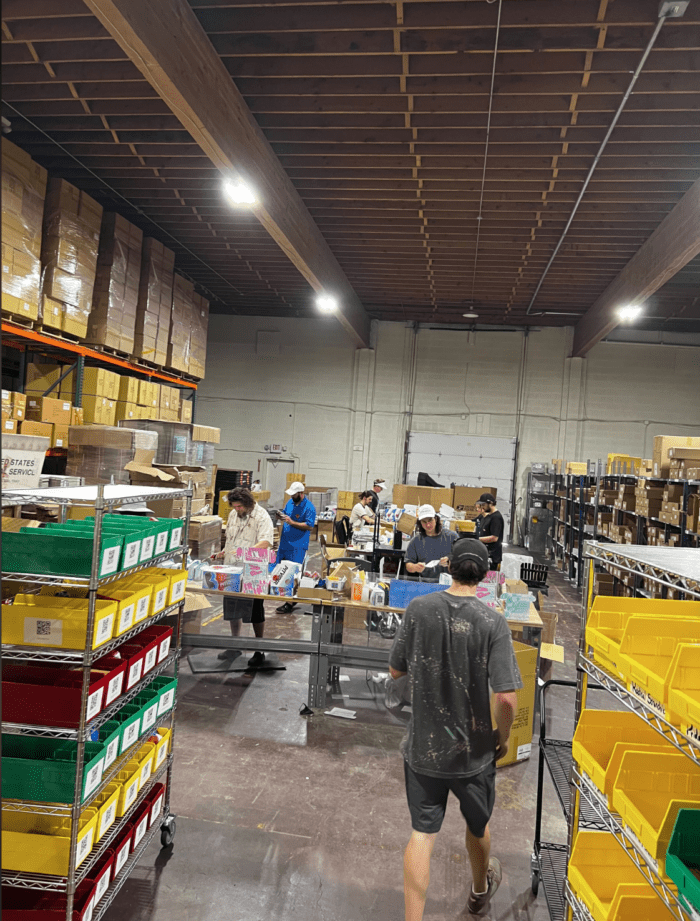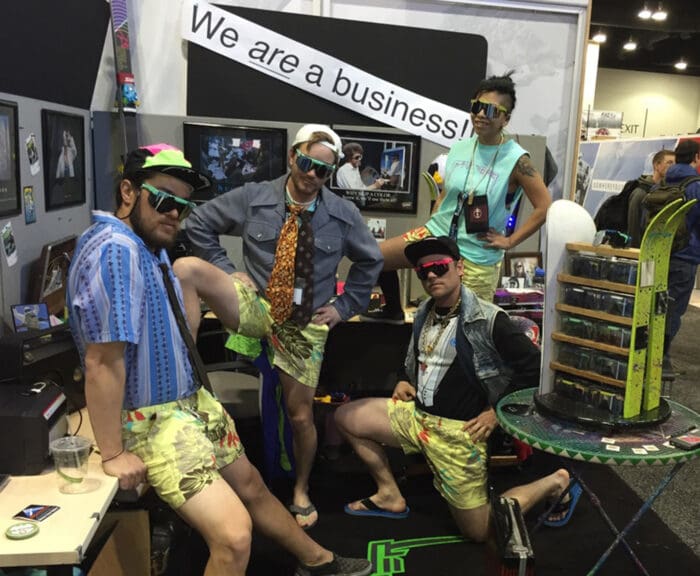Learn how Pit Viper went from trading their trendy shades for ski lift tickets to scaling into a global 8-figure sunglasses brand.
Customer Profile
Pit Viper was born because founder, Chuck Mumford needed sunglasses for the ski slopes. Over a decade later, consumers from all over the globe have adopted Pit Vipers as part of their everyday attire for activities ranging from skateboarding to surfing to just hanging out. Pit Vipers have become a cultural phenomenon, representing fun, fearlessness, and living boldly.

- 80 total employees
- 20 fulfillment center employees
- 1 PitViper fulfillment center: 16k sq. ft. in Salt Lake City, Utah
- 2 ShipBob fulfillment centers: Melbourne, AU and Ontario, CA
- 99.7% accuracy rate achieved with Merchant Plus
- 2,100 mispicks eliminated annually with Merchant Plus
Chuck Mumford needed better sunglasses. After days of hitting the ski slopes and nights of partying with friends, he found that there wasn’t a sunglasses brand that could keep up with his lifestyle.
When he visited a military surplus store in 2012, Chuck was inspired by the durable sunglasses he found there and decided to put his own spin on the shades. Chuck, along with his friend and Pit Viper co-founder, Chris Garcin, splatter painted the sunglasses in bright colors and began selling them out of his garage in Utah. The wraparound shades offered maximum protection from the elements, and the bold design looked effortlessly cool, making them the perfect sunglasses for any activity.
The retro-inspired, larger-than-life shades were an instant success. Chuck and Chris sold out of their unique, high-quality sunglasses and turned to Kickstarter to get Pit Viper off the ground. In 2014, Chuck and his team exceeded their goal of raising $30,000 and were able to bring Pit Vipers to the masses.
Utilizing cheeky slogans, innovative marketing strategies, and a range of athlete endorsements, Pit Viper skyrocketed in popularity. Due to their growth, Pit Viper needed a fulfillment process that could make their in-house order picking more efficient while giving them options to scale internationally.
That’s when they turned to ShipBob’s hybrid fulfillment solution: Merchant Plus warehouse management system (or WMS) for their in-house fulfillment, coupled with ShipBob’s outsourced global fulfillment centers in Canada and Australia.
ShipBob sat down with Jourdan Davis, Pit Viper’s Operations Manager, to learn more about how they maximize warehouse efficiency (and fun).
As told to ShipBob by Jourdan Davis, Pit Viper’s Operations Manager

At Pit Viper, we’ve always done self-fulfillment. The company started out as a small operation with several founding members doing everything from making the sunglasses to shipping them out. But as we started to grow, we moved into a warehouse and hired 5 to 10 shippers.
Then two years ago, we moved into a larger warehouse and added more people, which became a fulfillment team of about 20.
I was hired as Warehouse Manager to revamp the fulfillment process. At the time, we were using a label generator software to get orders shipped out. It obviously didn’t serve as a warehouse management system, but simply a way to create our shipping labels. There was no way to optimize efficiencies within our warehouse.
We were outgrowing that solution and our own warehouse, and weren’t able to keep up with shipping deadlines. Customer service is one of our biggest priorities and that was falling behind, so we decided to move toward a hybrid fulfillment model.
We wanted to outsource international fulfillment to alleviate the pressure put on our in-house team (and high costs and long transit times for our customers), while dialing in on making our own warehouse more efficient.
We began vetting warehouse management systems that would provide structure and make our processes and workflows more efficient. I met with ShipBob and felt like they would be a good partner because they could offer all of the solutions we needed.

Onboarding with ShipBob’s Merchant Plus was our first time connecting to a warehouse management system, so we had to get data and SKUs synced with the platform, do warehouse mapping, and get our various integrations (like Shopify and NetSuite) set up. Once everything was in place, we just had to flip a switch to start fulfilling orders.
The ShipBob team even came out to our facility for a week to show us how to do everything. It was a super straightforward process. It’s a very plug-and-play solution that is also customizable to our workflows.
From the beginning, the ShipBob team has been really receptive to our ideas. We’ll ask for something, and it will go into the product feature request queue. We also have a great working relationship with Blair and Emily from ShipBob’s Merchant Success team with open lines of communication.
For us, one of the greatest benefits in using Merchant Plus has been reducing mispicks. Before ShipBob, when we were just relying on label generation software, we didn’t have a way to validate which products were going out to customers. The label would say “pick 3 of these specific sunglasses” but really, you could have sent any type of sunglasses since there was no validation – and that happened frequently.
“One of the biggest reasons we went with ShipBob is the multiple checks from start to finish. The WMS makes it really hard to send out the wrong product. It still happens on rare occasions – but it happens a lot less than before. Before we implemented Merchant Plus, our order accuracy rate was around 92%. Now we’re at 99.7% for order accuracy, which equates to 2,100 less mispicks a year on average.”
Jourdan Davis, Operations Manager at Pit Viper
When misshipments happen, we typically let customers keep the products because it’s more work to have them return the items. So ShipBob’s system for picking orders has cut down on labor costs, reduced lost inventory, and eliminated the need for double shipping. That’s been huge for us.
Our order picking and routing has also greatly improved with ShipBob. With the Merchant Plus system, we can create the most efficient routes through the warehouse, which has cut down on an insane amount of time and made picking, packing, and shipping so much more efficient.
Running a warehouse is unpredictable. But ShipBob has definitely helped with that. Thanks to Merchant Plus, we have access to more data. Now we know how many orders an employee can complete in an hour so we can forecast for labor a lot better than we did before.

When we began outsourcing our international fulfillment to ShipBob, we initially started with Canada since it’s our second largest market. Since then, we’ve seen increased customer satisfaction because packages are going out faster and cheaper than before. It has also taken work off of our in-house warehouse staff in Utah.
The biggest lift when we expanded into the Canadian market was getting our products to the fulfillment center and forecasting inventory. But we figured things out, which made expanding to Australia smooth sailing. We knew what we were doing at that point.
We know how to forecast really well now, so we sent our inventory to ShipBob’s fulfillment center in Melbourne and it’s been really great. Just like in Canada, we’re seeing improved customer satisfaction because customers in Australia don’t have to wait between the typical 2 weeks to a month to get a package from the United States.
“ShipBob has been a big help with us hitting international markets, having one central system to fulfill orders in the US, Australia, and Canada. We are able to penetrate those markets better because more customers will actually get the glasses they ordered in days instead of weeks.”
Jourdan Davis, Operations Manager at Pit Viper

We’re going to be expanding our warehouse space from 10,000 sq. ft. to 16,000 sq. ft., and for getting started in the new space we won’t even need ShipBob to come out and assist us with that move. They taught us how to do everything: get the locations up, map the warehouse, everything. We’ll be able to onboard ourselves which is cool to see.
Our goal is to maintain steady growth. Our older volume continues to increase. In 2022, we saw order volume increase, as we had over 500,000 orders. We’re going to continue hitting our international markets to achieve growth. We’ve been looking into the UK and EU as our future markets we enter geographically through ShipBob.
Additionally, we’ve experienced a huge spike in our B2B orders. We’ve partnered with some big names in the retail space, so our B2B orders will continue to grow as well as DTC. We’re also diversifying our line of sunglasses with 12 new lines out now.
Overall, our growth and expansion has been monumental given our roots, and this in part due to the partners we have. Pit Viper sort of started as a joke. Our founders got started by handing out sunglasses for ski tickets, but now we’re a multi-million dollar company. We’ve grown from having our 2 founders doing everything, to a business with 80 employees.
We have signs in the office that remind us that “we are a business” because we have a warehouse management system, a really dialed-in marketing team, and a strong customer service team. The progression of the business and team in the 2 years I’ve been here has been crazy. We’re competitive with all the other sunglass companies out there, while still having the most fun.


Nick Hendricks
Nick is a Enterprise Account Executive – Team Lead at ShipBob. He helped bring Pit Viper onboard with ShipBob.

Jivko Bojinov
As ShipBob co-founder and SVP of Strategy, Jivko serves as Pit Viper’s Executive Sponsor.
If a hybrid fulfillment solution sounds like the strategy your brand needs in order to scale, request a quote to connect with the ShipBob team.
Post Disclaimer
The information provided in our posts or blogs are for educational and informative purposes only. We do not guarantee the accuracy, completeness or suitability of the information. We do not provide financial or investment advice. Readers should always seek professional advice before making any financial or investment decisions based on the information provided in our content. We will not be held responsible for any losses, damages or consequences that may arise from relying on the information provided in our content.



